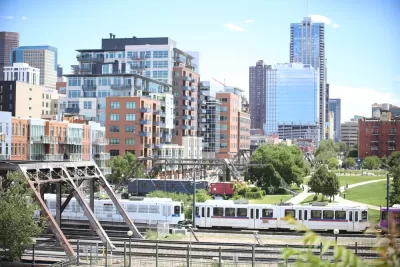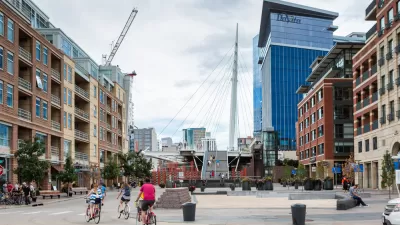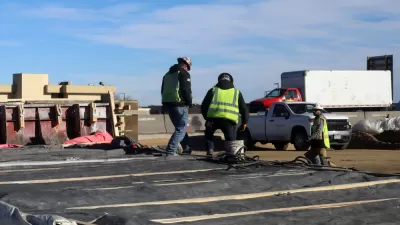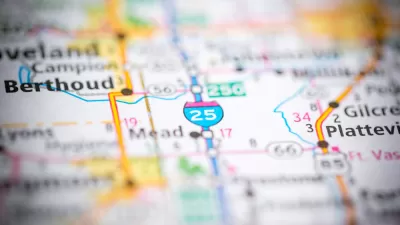Multiple funding plans are on the brink of reformulating the state of Colorado’s approach to transportation—away from cars and toward active transportation and high-capacity public transit.

“Rewrites of Colorado’s statewide 10-year priority project plan and two Front Range regional transportation plans are nearing adoption in the next month,” reports Jon Murray for the Denver Post.
“Especially in metro Denver, they shift big money from expanding pavement to other projects that make it easier, and safer, to travel on public transportation, on bike or on foot.”
The Denver Regional Council of Governments’ 2050 regional transportation plan, one of the plans up for approval this month, would speed up plans for bus rapid transit along busy arterial streets (see previous Planetizen coverage of the DRCOG’s 2020 regional transportation plan). “In the proposed update, those plans have been accelerated — with five projects now set out by 2030 along East Colfax Avenue in Denver, long in planning; a Colfax extension through Aurora; and long stretches of Federal Boulevard, Colorado Boulevard, and Colorado 119 between Boulder and Longmont. More rapid bus corridors would follow in the 2030s,” reports Murray.
Other plans include an updated 2045 regional plan by the North Front Range Metropolitan Planning Organization, which covers a region including Fort Collins and Greeley, and an update to the state’s ten-year project plan, under consideration his week by the Colorado Transportation commission.
Murray gives credit for the shift in transportation funding priority to legislation, SB21-200, approved by the Colorado State Legislature and signed by Governor Jared Polis last year. The Colorado Transportation Commission has already adopted new greenhouse gas emissions rules enabled by that legislation.
FULL STORY: More rapid bus lines, fewer highway expansions: New plans for metro Denver set shift in project funding

Planetizen Federal Action Tracker
A weekly monitor of how Trump’s orders and actions are impacting planners and planning in America.

San Francisco's School District Spent $105M To Build Affordable Housing for Teachers — And That's Just the Beginning
SFUSD joins a growing list of school districts using their land holdings to address housing affordability challenges faced by their own employees.

The Tiny, Adorable $7,000 Car Turning Japan Onto EVs
The single seat Mibot charges from a regular plug as quickly as an iPad, and is about half the price of an average EV.

Seattle's Plan for Adopting Driverless Cars
Equity, safety, accessibility and affordability are front of mind as the city prepares for robotaxis and other autonomous vehicles.

As Trump Phases Out FEMA, Is It Time to Flee the Floodplains?
With less federal funding available for disaster relief efforts, the need to relocate at-risk communities is more urgent than ever.

With Protected Lanes, 460% More People Commute by Bike
For those needing more ammo, more data proving what we already knew is here.
Urban Design for Planners 1: Software Tools
This six-course series explores essential urban design concepts using open source software and equips planners with the tools they need to participate fully in the urban design process.
Planning for Universal Design
Learn the tools for implementing Universal Design in planning regulations.
Smith Gee Studio
City of Charlotte
City of Camden Redevelopment Agency
City of Astoria
Transportation Research & Education Center (TREC) at Portland State University
US High Speed Rail Association
City of Camden Redevelopment Agency
Municipality of Princeton (NJ)





























